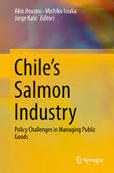Chile's Salmon Industry: Policy Challenges in Managing Public Goods

The salmon industry of Chile, a global salmon producer, currently supplies a third of worldwide production, second to Norway. How did Chile, which had no wild salmon habitat, transform itself into a major salmon exporter in the global market?
This book illustrates the development of Chile's salmon industry, which was non-existent but created over the course of 20 years beginning in the 1970s. With a historical and holistic approach, the book discusses this with a focus on four areas: knowledge development, environmental sustainability, institutional development and social inclusion (social welfare). Through the lessons learned from the development of Chile's salmon industry, the book aims to address the issues and challenges that developing countries are likely to face in their natural resource-based industries. It does so by focusing on policy intervention in managing public goods optimally to achieve successful and sustainable economic development.
The book was jointly edited by Akio Hosono, JICA-RI senior research advisor, Michiko Iizuka, research fellow at the United Nations University, Maastricht Economic and Social Research and Training Center for Innovation and Technology (UNU-MERIT), and Jorge Katz, professor at the University of Chile.
One of the important cases the book studies is the "Japan-Chile Salmon Project," in which JICA played a catalytic role. The project greatly contributed to creating a knowledge base by technological transfer. The contribution led to Chile's success in the salmon industry, bringing about dramatic economic growth and significantly increasing jobs in a direct and indirect manner in southern regions of Chile.
Early in the book, the authors describe the inception phase in which the Chilean government made efforts in knowledge creation and diffusion to establish a new industry. Economic activities were successfully expanded. Then the book details the unfolding of the sanitary crisis that consequently emerged and elaborates on the need for regulatory institutions to ensure the sustainability of industry. Subsequently it discusses the transformation of institutions to fit into local settings with a complex context of interactions among various agents.
The book reveals the importance of inclusive institutions in sustainable production activities, highlighting the role of the public sector in improving the social welfare of local populations in partnership with the private sector and civil society.
In the foreword, former president of JICA Akihiko Tanaka wrote, "I am convinced that this publication will offer insightful lessons that can be applied to other natural resource-based sectors and industries facing similar challenges during the course of development."
scroll